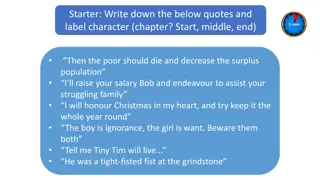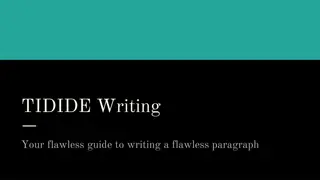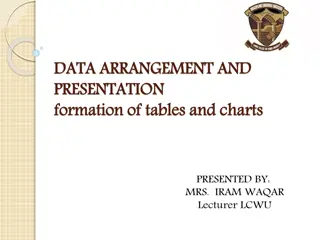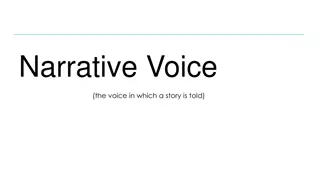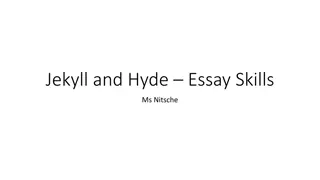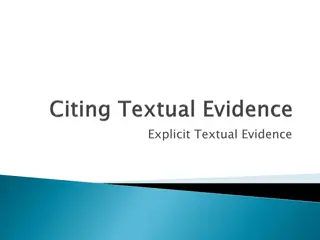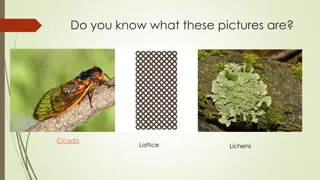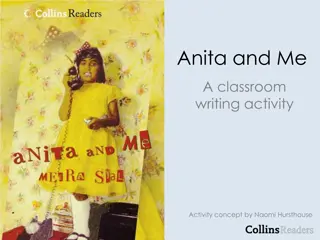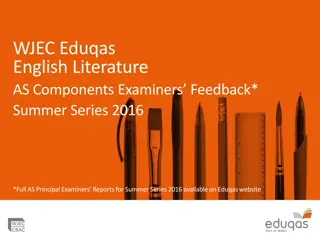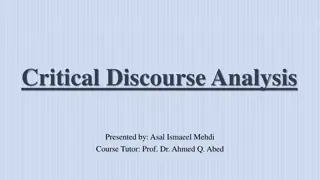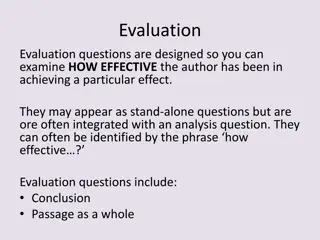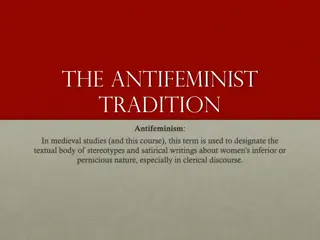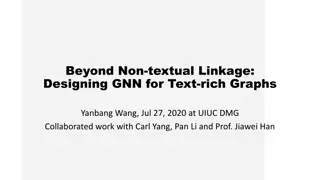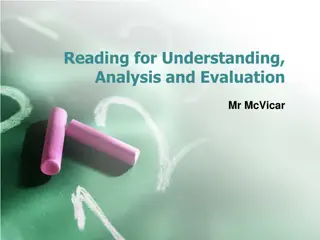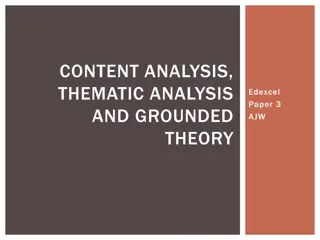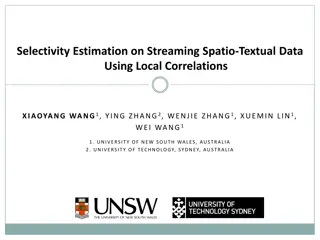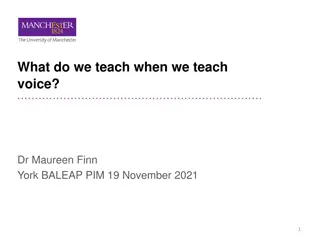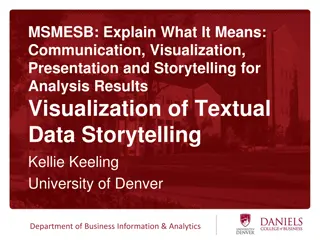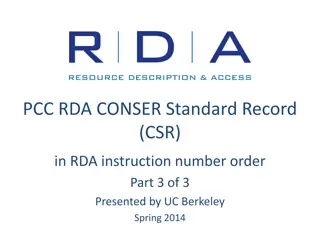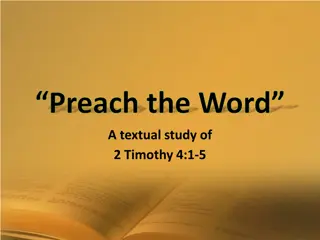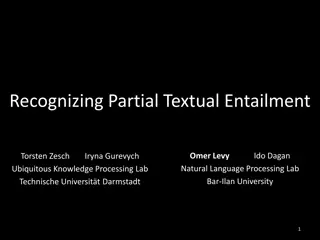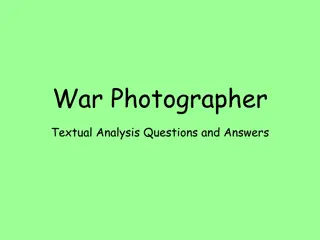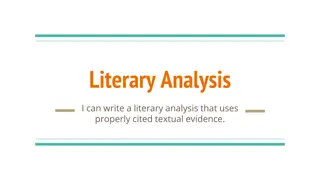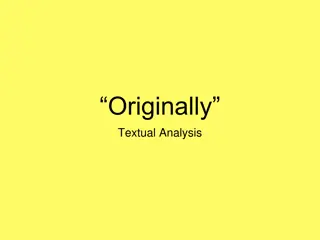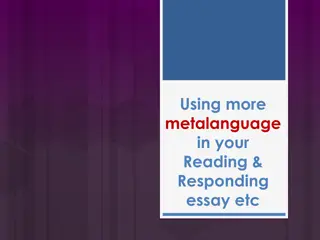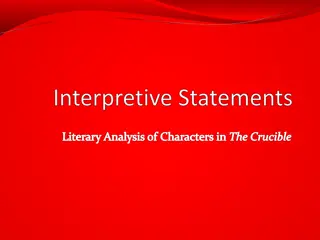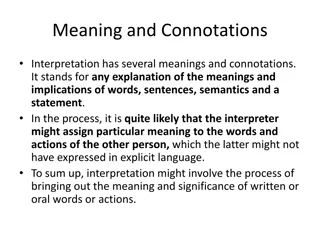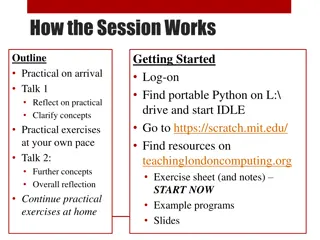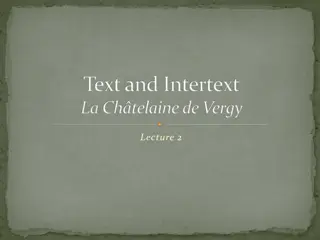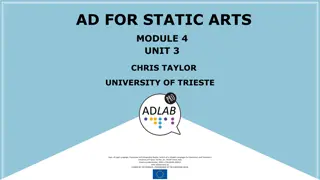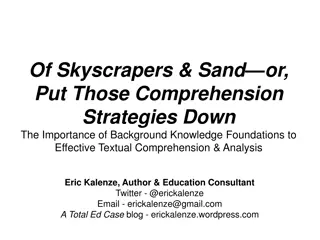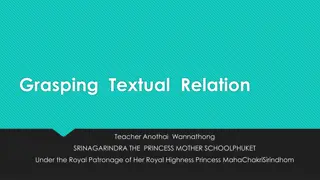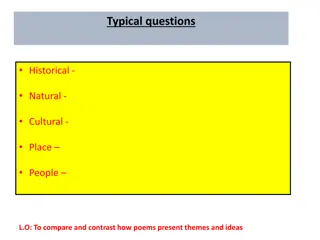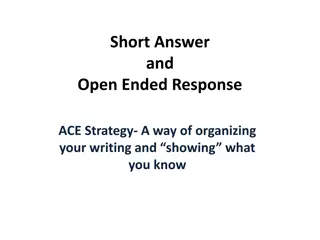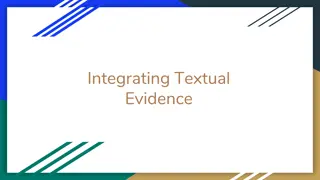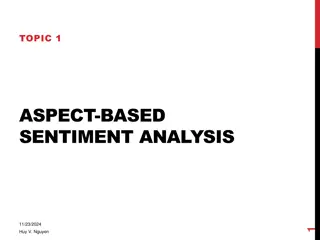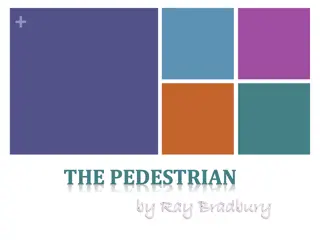Importance of Context in Discourse Analysis
Understanding context is crucial in discourse analysis as it helps interpret the meaning of words based on physical, social, and psychological factors, as well as the temporal and spatial dimensions of communication. Three key types of context include situational, background knowledge, and co-textua
1 views • 12 slides
Exploring Close Reading and Vocabulary in "St. Lucy's Home For Girls Raised by Wolves
Dive into a lesson agenda focusing on close reading, vocabulary building, and textual analysis of the book "St. Lucy's Home For Girls Raised by Wolves" by Karen Russell. Discover how authors use specific words to evoke a sense of place, annotate connections in the text, and explore unique vocabulary
3 views • 59 slides
Exploring Themes in 'A Christmas Carol' and GCSE Literature Paper 1: Insights and Analysis
Delve into the themes of poverty, generosity, and redemption through iconic quotes from "A Christmas Carol". Understand the key indicators for GCSE Literature Paper 1, focusing on allegory and writer's purpose. Learn how to achieve top grades through textual analysis and strategic revision.
0 views • 12 slides
Mastering Topic Sentences and Textual Evidence in Academic Writing
Learn how to craft effective topic sentences for your paragraphs, serving as mini-theses and providing a clear roadmap for your writing. Understand the importance of inference and textual evidence to support your ideas with relevant quotes and facts. Enhance your academic writing skills by mastering
0 views • 20 slides
Principles of Data Arrangement and Presentation for Effective Analysis
Effective data arrangement and presentation are crucial for engaging readers, maintaining conciseness, and enabling quick insights and conclusions. Methods such as textual, tabular, and graphical presentations aid in statistical analysis. Learn about the importance of organizing data from lowest to
0 views • 55 slides
Understanding Narrative Voice in Fiction Writing
Explore the elements of narrative voice in fiction writing, including tense, perspective, and language choices. Learn how authors decide on the tense and perspective for their stories, and consider different language styles that suit various characters and perspectives. Discover the nuances of first
1 views • 7 slides
Mastering Essay Skills: Jekyll and Hyde Analysis
Enhance your essay writing skills with a step-by-step guide focusing on key elements such as introduction structure, topic sentences, evidence selection, and analysis strategies using the classic tale of Jekyll and Hyde. Learn to formulate strong arguments supported by textual evidence for insightfu
0 views • 18 slides
Mastering Explicit Textual Evidence in Reading Comprehension
Enhancing reading comprehension by utilizing explicit textual evidence to support ideas and opinions about the text. Learn how to clearly state ideas, specify text references, and comment on evidence to bolster your interpretations effectively.
0 views • 15 slides
Exploration of Poetry Forms: Cicada, Lattice Lichens, Lyric Ode, and Poetic Analysis
Discover the beauty and intricacies of poetry through the exploration of images depicting Cicada, Lattice Lichens, Lyric Ode, and poetic analysis. Dive into the world of Odes, Lyrical poems, and analyze how poets use form and figurative language to express emotions and ideas. Uncover themes of natur
0 views • 6 slides
Analyzing Power Dynamics in 'Anita and Me' - Classroom Activities
Engage students in exploring power dynamics among characters in the book "Anita and Me" through a series of classroom activities. From ranking words to group activities focusing on Anita's power traits, students will delve deep into character analysis and textual evidence, enhancing their critical t
0 views • 8 slides
Effective Strategies for AS English Literature Examinations
Targeting AO1 and AO2 in AS English Literature exams requires focused analysis of extracts and proper engagement with the task. Avoid irrelevant details, stay concise, and make every word count. For longer essay responses, plan carefully, engage directly with the question, and provide brief, relevan
0 views • 6 slides
Introduction to Critical Discourse Analysis (CDA)
Critical Discourse Analysis (CDA) is the study of language use in social contexts, integrating social theories with discourse analysis methods. Originating in the 1970s as Critical Linguistics (CL), CDA evolved to focus on how language reflects and shapes social meaning. The relationship between CL
0 views • 32 slides
Macbeth Act 3, Scene 4 Analysis
Explore deep into Macbeth Act 3, Scene 4 where the chilling encounter with Banquo's ghost shakes Macbeth to his core during a banquet. Dive into comprehension questions, textual analysis, and the unraveling of Macbeth's guilt through key quotations.
0 views • 16 slides
Analysis of Evaluation and Conclusion Questions in Textual Analysis
Evaluation and Conclusion questions play a crucial role in assessing the effectiveness of an author in achieving specific effects and summarizing key points in a passage. These types of questions are commonly found in textual analysis tasks to evaluate the success of conveying ideas and themes. Eval
0 views • 9 slides
Unveiling the Antifeminist Tradition: Ideological Roots, Textual Sources, and Female Nature
Explore the antifeminist tradition in medieval studies through a deep dive into its ideological roots, main textual sources, and portrayal of female nature. Discover how stereotypes and satirical writings about women's perceived inferiority have persisted throughout history, informed by clerical, in
0 views • 9 slides
Enhancing Graph Neural Networks for Text-rich Graphs
Designing GNNs for text-rich graphs involves considering both textual and non-textual linkage information among entities, such as papers, webpages, and people. Utilizing structural information beyond citation networks and exploring latent textual linkages are key challenges. Previous work has focuse
0 views • 33 slides
Enhancing Critical Reading Skills: Understanding, Analysis, and Evaluation in Literature
This content provides insights into developing critical reading skills, expanding knowledge of literary techniques, and preparing for assessments. It covers the concept of RUAE (Reading for Understanding, Analysis, and Evaluation), understanding questions, types of understanding questions, and tips
0 views • 119 slides
Understanding Content Analysis: Methods and Techniques
Content analysis is a research method used for interpreting textual data through systematic classification and identification of themes or patterns. It involves qualitative data reduction to reveal core consistencies and meanings. Thematic analysis, a part of content analysis, derives themes from qu
0 views • 15 slides
Selectivity Estimation on Streaming Spatio-Textual Data Using Local Correlations
This research focuses on efficient selectivity estimation on streaming spatio-textual data by incorporating local correlations. It addresses the challenge of estimating the number of objects in a query region with specific keywords in real-time. The study proposes novel approaches like ASP-tree and
0 views • 29 slides
Understanding Voice in Academic Writing: A Comprehensive Overview
Delve into the nuanced concept of voice in academic writing through a discussion of its definitions, classroom implications, evaluation aspects impacted by identities, and the importance of writer ownership. Explore the complex interplay of textual and non-textual elements shaping writer identity. C
0 views • 27 slides
Effective Communication and Visualization Techniques for Analyzing Textual Data
Enhance your data analysis skills with effective communication, visualization, presentation, and storytelling techniques. Discover how to analyze textual data through word/phrase frequencies, collocations, and clustering. Explore tools for text processing and natural language processing, such as Exc
0 views • 21 slides
Cataloging Rules and Processes for Textual Resources in RDA
Learning objectives and training provided by UC Berkeley in Spring 2014 on applying the CONSER Standard Record and RDA instructions to describe textual serials and integrating resources in various formats. The acronym review covers core elements and differences between AACR2 rules/AACR2 version of C
0 views • 44 slides
A Textual Study of 2 Timothy 4:1-5
In this textual study of 2 Timothy 4:1-5, the solemn charge of preaching the Word is emphasized, emphasizing the importance of proclaiming religious truths and principles to prepare for Jesus' return and eternity. The passage highlights the gravity and seriousness of preaching, urging preachers to f
1 views • 31 slides
Understanding Textual Entailment in Natural Language Processing
This collection of images showcases various aspects of textual entailment, where one text can entail another. It explores the relationship between statements like "muscles move bones" and "muscles generate movement". Different levels of entailment are depicted, culminating in complete textual entail
0 views • 72 slides
Analysis of "War Photographer" Poem and Images
This textual analysis delves into the structure, comparisons, effects, and ambiguities found within the poem "War Photographer." It explores the contrast between the structured verses and chaotic images described, the poet's likening of the photographer to a priest, the impact of specific sentence s
0 views • 19 slides
Dive into Literary Analysis: Understanding the Depths of Textual Meaning
Literary analysis involves dissecting literature to uncover the significance of its parts and how they contribute to the overall meaning. By examining rhetoric and story elements, and exploring the significance and meaning behind the text, readers can gain a deeper understanding of the author's mess
0 views • 10 slides
Originally Textual Analysis: Understanding Duffy's Poem Stanza by Stanza
Explore the emotional journey depicted in Duffy's poem "Originally" as the narrator recounts the family's relocation from Scotland to England. The analysis delves into themes of reluctance, unease, and identity conflict, highlighting the speaker's evolving perspective on home and belonging.
0 views • 16 slides
Analyzing Texts: Constructing Meaning with Metalanguage
Explore the construction of meaning in a text through the author's use of metalanguage, examining social, historical, and cultural values embedded within the text. Understand how textual evidence supports analysis and interpretation, recognizing the text's openness to diverse interpretations. Discov
0 views • 20 slides
Character Analysis in "The Crucible": Unveiling Motives and Conflicts
Dive into a detailed literary analysis of characters in "The Crucible," exploring their motivations, conflicts, and relationships through interpretive statements backed by textual evidence from the play.
0 views • 7 slides
Unveiling the Art of Interpretation: From Textual Meanings to Contextual Significance
Interpretation delves into the meanings and implications of words, sentences, and classical texts, bringing out their significance. It involves decoding complex ideas, separating temporal and perennial thoughts, and revealing contemporary relevance. Different approaches like textual and contextual a
0 views • 18 slides
Transitioning from Scratch to Python: A Practical Approach for Learning Textual Programming
Explore the transition from visual programming in Scratch to textual programming in Python using Turtle Graphics. Engage in practical exercises, clarify key concepts, and reflect on the challenges and progress in learning core programming concepts. Utilize resources from TeachingLondon Computing to
0 views • 21 slides
Exploring Intertextuality in Medieval Manuscripts
Delve into the concept of intertextuality in medieval manuscripts, focusing on the Châtelaine de Vergy. Discover how manuscript culture and mouvance shape textual mobility and authorship perceptions. Uncover key points on manuscript variations and the dynamic nature of medieval works. Critically ex
0 views • 16 slides
Linguistic and Textual Features of Ad in Static Arts
Explore the linguistic and textual features of advertising in static arts, focusing on the use of present tense, short declarative sentences, and vivid vocabulary. Understand how cohesion, repetition, and non-finite verbs contribute to the impact of museum advertisements compared to general ads.
0 views • 23 slides
Importance of Background Knowledge for Effective Textual Comprehension
Understanding the significance of background knowledge in enhancing textual comprehension is crucial for education. The article emphasizes the misinterpretation of Bloom's Taxonomy and the need to recognize reading as more than just a skill. It highlights the importance of foundational knowledge in
0 views • 25 slides
Understanding Textual Relations in Language Teaching
Explore different types of textual relations such as lexical cohesion, grammatical cohesion, and more in language teaching. Learn how sentences are related through vocabulary, synonyms, general terms, and pronouns to enhance understanding and coherence in writing. Examples from the Grasping Textual
0 views • 23 slides
Exploring Poetry Analysis and Comparison Techniques
Dive into the realm of poetry analysis by comparing and contrasting how different poems present themes and ideas. Discover strategies for examining language, form, and structure used by poets to convey meanings and effects. Enhance your understanding of textual contexts and learn how to craft inform
0 views • 23 slides
Effective Writing with the ACE Strategy
Unlock the power of the ACE strategy to enhance your writing by answering questions with restated prompts, citing textual evidence, and providing detailed explanations. Understand the importance of textual evidence and learn how to structure your responses effectively to convey your understanding co
0 views • 16 slides
Mastering the Art of Integrating Textual Evidence
When incorporating textual evidence into your writing, it is crucial to use quotes strategically, ensuring they enhance your argument. By leading readers into and out of quotes seamlessly, and blending them into your sentences creatively, you can maintain the integrity and impact of the original tex
0 views • 8 slides
Understanding Aspect-Based Sentiment Analysis in Text Mining
Aspect-Based Sentiment Analysis plays a crucial role in extracting, identifying, and characterizing sentiment content within text data. This analysis helps in understanding how people perceive various aspects in reviews, blogs, and online discussions. The process involves detecting entities, aspects
0 views • 18 slides
The Pedestrian by Ray Bradbury - Analysis and Themes
The story follows Mr. Leonard Mead, who loves walking the city streets at night in a totalitarian society set in 2053. He encounters a police car that stops him, leading to themes of dehumanization through technology, the impact of television, and loneliness. Through detailed textual analysis, the s
0 views • 18 slides


